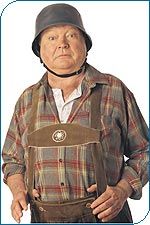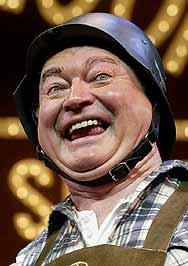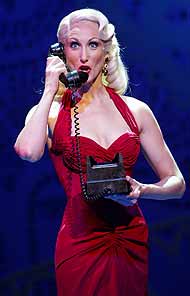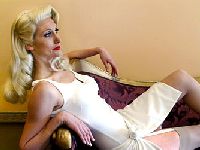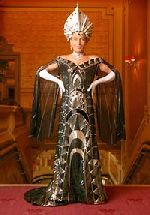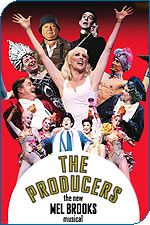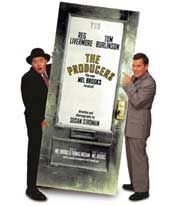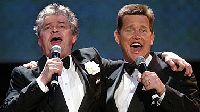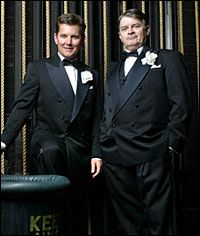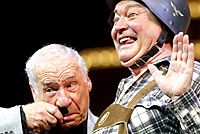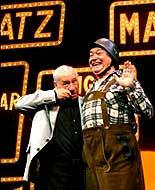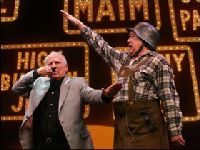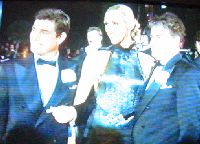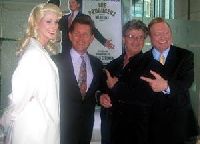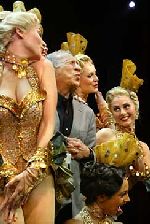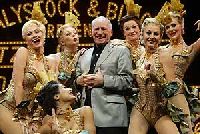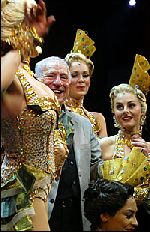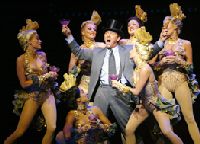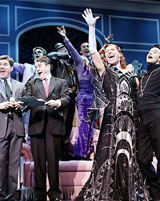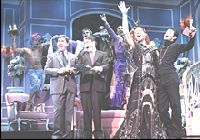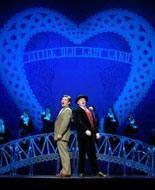Showtime for Hitler April 18, 2004 The Age
It's got pigeons and piggy banks, storm-troopers and show stoppers. Every detail has to be right, down to the last swastika. Michael Shmith goes backstage at The Producers to witness the American invasion as Springtime hits Spring Street.
It is an otherwise calm Friday afternoon, and we are on stage at the Princess Theatre with Adolf, Berte, Otto, Wolfgang, Schatzi, Heidi, Eva and Heinz.
They can only be described as Nazi pigeons. Above our heads hangs a German tank and, down stage left, a few storm-trooper jackets bearing familiar red-and-black armbands.
A cluster of walking frames are stacked nearby, alongside several pink piggy banks. Willkommen, bienvenue, welcome to The Producers, the hit show about a flop that becomes a hit. The Australian production, starring Reg Livermore as the outlandish one-time king of Broadway, Max Bialystock, and Tom Burlinson as his mildmannered accountant-turned-producer sidekick Leo Bloom, burst into life last night at the Princess Theatre.
Getting to first night has been only slightly less complicated than organising the troops at Stalingrad and marginally less expensive than the value of the Reichstag's gold reserves.
The campaign has been masterminded by the show's original creative team, led by its director and choreographer, Susan Stroman, who took the early rehearsals and returned for the last week of previews.
Big show, big budget. The Producers' producer, John Frost, says the Australian production has already cost $6 million, and that's before opening night. After that, Frost says, it will cost about $450,000 a week just for the theatre rental and salaries.
Much, therefore, depends on the box office, and Frost and his co-producers, SEL, are as anxious to see a hit as Bialystock and Bloom are desperate for a flop.
The Producers may have an all-Australian cast, there may be an absence of Jewish performers (I'm told there is one in the ensemble), but the production is as close to the original as it could be without renaming Spring Street Broadway.
The American production team has been here to ensure everything, but everything, is re-created exactly. To illustrate how, John Frost, over a hasty sandwich and coffee, reassigns his cutlery: "You move that knife to there, pick up the fork and put it there, you are told, 'No, put it there'. That's what it's like. It's that regimented. Down to everything. Then they say 'When you've learnt to put that knife there and that fork there, then you can put your stamp on it'."
The best example of doing it by the book can be found back in the theatre. Leading us around the bits and pieces of old Broadway (the show is set in 1959), is The Producers' head of props, Laura Koch.
There is nothing Koch does not know about the show. She was responsible for the genesis of the 400-odd props, which range from life-size puppets and furniture to the cheques, contracts and first-night tickets to Springtime for Hitler, (the musical in the musical).
Even the things the audience could never properly see are detailed down to the last signature and seat-number.
For example, the congratulatory telegrams on Max Bialystock's office wall have special messages. One reads, "Max, Iceman came and went. Still no money. Lawyers will be in touch. Eugene."
Koch had the tickets reprinted twice: once because the printed date, April 24 (her husband's birthday), did not tally with the date the show would have opened, September 13 (her husband's lucky number); the second time because they said "Max Bialystock presents" instead of "Bialystock and Bloom presents".
"I thought it wouldn't matter," says Laura, who is holding one of the pigeon puppets in her left hand, its head swivelling to and fro as she talks.
"But I've found the more attention to detail I can bring, the more relaxed and happy the actors are in their characters."
The pigeon, by the way, is called Adolf, who, with his eight caged siblings, is owned in the show by Franz Liebkind, author of Springtime for Hitler and arch devotee of the Fuhrer.
Koch has been in Melbourne to make sure each and every prop is in its right place at the right time.
Every item, she says, has a history, a story, a life. She says she can recite them all from memory, but in case this fails, and for the benefit of lesser minds, she has them listed and photographed in two chunky manuals (one for each act) she calls "the props bible". They could have been printed by the Gutenberg who is not the proprietor of a New York deli.
The Producers, which started life as a cult late- '60s film, became a Broadway musical in 2001 and is about to be a film (of the musical) again, bears the unmistakable stamp of Mel Brooks, Hollywood and Broadway’s king of schtick.
Who else could get away with a plot about two huckster producers who stage the world's most offensive, overcapitalised musical in hope of a second- night close and escape to Rio with their investors' money?
Worse — who could write a production number, Springtime for Hitler, in which the moustachioed one with the floppy black hair, sings: "I was just a paper hanger/ no one more obscurer./ Got a phone call from the Reichstag,/ Told me I was Fuhrer./ Germany was blue,/ What, oh, what to do?/ Hitched up my pants/ and conquered France/ Now Deutschland's smiling through!"?
Listen carefully earlier in the same number, to a solo line from the depths of the storm-trooper chorus line: "Don't be stupid, be a smarty, come and join the Nazi party!"
The voice mimed by the actor — in the film and now the musical — is the husky Brooklyn tones of Maestro Mel himself. There's no escaping him. Indeed, The Producers' subtitle, carefully observed in all its promotional material, is "The new Mel Brooks musical". And Mel's Puckish spirit, well in advance of his actual presence for the opening, has pervaded every moment of rehearsal.
Susan Stroman's now famous first meeting with Brooks was when he visited her apartment in 1998.
"He was my hero. I knew every movie he ever made," she says. "I opened the door, ready to see this legend. Instead of shaking hands, his arms went up in the air, he launched into a song from the show, That Face, and danced down the hallway and jeteed on to the sofa. 'Hello, I'm Mel Brooks.' Whatever he wanted I wanted to be a part of it."
Originally, Stroman was to choreograph The Producers, but found herself directing it as well, taking over from her husband, Michael Ockrent, who died of cancer in December 1999.
"We went into rehearsal a year after Mike died, and Mel thought because I knew it already, I'd be the one to direct it. Having Mel in your life when you're grieving was the greatest antidote; he really saved me." She speaks of "constant creation, constant energy". No more so than with the show itself. The Australian production is the fifth Stroman & Co. have created. The others are on Broadway, in Toronto and two US touring companies; the London production opens in November.
How does Stroman adjust to working with different casts who might have their own ideas about character and motive? "We teach them the show," she says. "All the sets and lights are the same, and there are patterns to follow in blocking and choreography. They are free within that world, and there are many moments when they are free to create. Reg (Livermore) has a wonderful drive: Max has to drive that show."
Max Bialystock is, indeed, a force majeur. The film's Max, the late Zero Mostel, was so formidable a presence, one could never imagine anyone else playing him. Then came Nathan Lane, the first stage Max.
"Nathan really stood on Zero's shoulders and created his own Max," says Stroman. "Now Reg will stand on Nathan's and Zero's." An alarming, somewhat precarious image, yet one with an element of truth.
"I may be the oldest Max in the world," says Reg Livermore, who is 65. He is possibly also the most exhausted. It is, he says, the most difficult thing he's ever had to do.
"I thought it was simple. It's complex. The way it has been directed and put together — it is choreographed within an inch of its life."
Why do it, then? "A good part's a good part. I was at the stage of wondering what lay ahead. At my age I'm not playing glamour roles or juvenile leads. I was attracted by the enjoyment factor: I don't want to be serious or gloomy — had all those in my professional life."
Rehearsals have not been easy for Livermore or others in the cast. "As your character grows, you question: when we will I be allowed to make him my own?" Clearly, Livermore and production team have had different ideas. "They want to make it their own first. It is difficult to come to terms with but you can see the wisdom. We're not the originators. We're given the blueprint that other people contributed to in the first place. The Americans are the horses' mouth and protective of their property. I'm all right about that."
Yet, one feels Livermore's Max Bialystock will have his own identity. "I can feel it happening in spite of myself," he says. "Mel Brooks said to me he didn't want me to waste my energies being a credible New York Jewish theatrical producer. 'You can't do it,' he told me. 'I would rather people say, "That's our Reg up there".' We should emphasise it is made our own."
The appeal to Australians, Livermore says, will be in the show's "larrikin elements". "I don't know who it will offend. The script confronts lots of issues. I'm sure the Americans who are here drilling us will be as interested as anyone else. They may be in for a shock."
Bottom-line time. Any show carries a high risk. As Max says to Leo, explaining the two cardinal rules of being a Broadway producer: "One, never put your own money in the show." "And two?" "NEVER put your own money in the show!"
Unlike Max Bialystock, John Frost is not wishing a sure-fire flop upon the world, but he has seen investments shrivel. He admits to a couple of Bialystock moments. "Two shows I had, Man of La Mancha and Footloose, bit the dust." This, he says, was part of a period with an over-supply of shows. "Too many people wanted to be a producer. There are only so many dollars to put towards hit musicals."
So why produce The Producers? Frost sees it as being a return to the good old-fashioned musical, with a great story and script. "If people were falling all over the place in New York, would they do it here or in Sydney? When you see the show, nothing has changed from Broadway; it's all there. The commercial theatre needs a hit and I'd like it to be this show."
Of course he would! So, too, would Frost's business partner, SEL. And so would the cast of 28 and orchestra of 19. But the word "risk" still hangs in mid-air. Frost hopes the show will run for at least eight months at the Princess, with a possible extension.
Certainly, says Frost, the appeal of The Producers to Australian audiences comes from the American television comedy we watched and still watch — from Jack Benny and Burns and Allen to Jerry Seinfeld.
"If we hadn't been brought up on American television, I'd be more worried," he says. The young John Frost started in theatre working as office boy for the late Kenn Brodziak — the closest Australia has had to a Max Bialystock in terms of character rather than choice of productions.
"He could peep through the curtain into the audience and tell you within a dollar the take for that performance," says Frost.
As with Brodziak, the Bialystocks of this world have all gone. "The people who produce now are all bottom-line people," says Frost. "The costs were much cheaper than they are now. Now, because they can lose so much money, some people in the industry don't know anything about theatre. They think doing a musical is easy: just putting on a show."
It takes guts to do this job. Especially of a show that contains this immortal line from its star: "I admit, for the last 20 years, I've been a lying, double- crossing, two-faced, backstabbing, despicable crook. But I had no choice I was a Broadway producer."
The Producers opened at the Princess Theatre last night.
